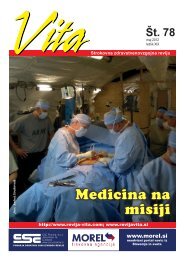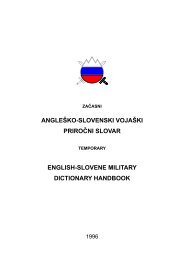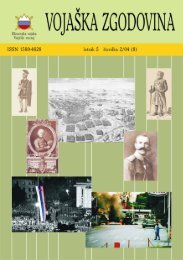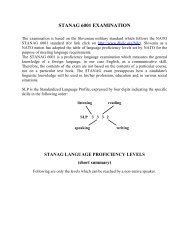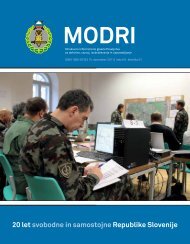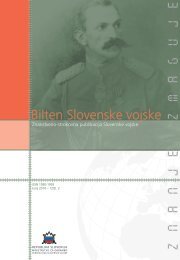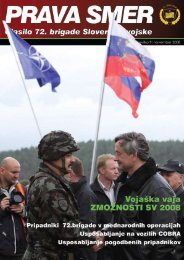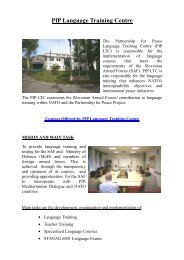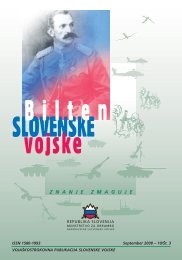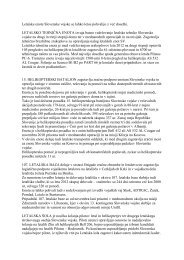Letnik 9/2, september 2007 - Slovenska vojska
Letnik 9/2, september 2007 - Slovenska vojska
Letnik 9/2, september 2007 - Slovenska vojska
You also want an ePaper? Increase the reach of your titles
YUMPU automatically turns print PDFs into web optimized ePapers that Google loves.
TERORISTIČNA GROŽNJA V NEMČIJI – NEMŠKI POGLED IN ANALIZA GROŽNJE<br />
of the OSCE Ministerial Council in December 2004 in Sofia was also dedicated<br />
to the subject of terrorism, with decisions being adopted on developing a border<br />
management plan, combating the use of the internet for terrorist purposes, and<br />
developing an OSCE-wide comprehensive system of export controls for manportable<br />
anti-aircraft systems. The OSCE is promoting practical cooperation with<br />
ICAO, UNDOC (United Nations Office on Drugs and Crime) and IAEO in the<br />
form of conferences and workshops involving participants from every region of<br />
the OSCE to make further effective progress in precisely these areas. NATO’s<br />
contribution to combating international terrorism should also not be overlooked.<br />
In addition to invoking the collective defense clause after 9/11 and compiling<br />
a comprehensive package of measures, NATO also set conceptually significant<br />
orientations, which are most clearly demonstrated by the decision to create the<br />
NATO Response Force, the anti-NBC initiatives, and the NATO Military Concept<br />
for Defence Against Terrorism (MC 472). On the basis of this latter Concept, the<br />
Alliance has placed a particular emphasis on improving preventative protective<br />
measures and launched practical initiatives to improve protection against<br />
NBC weapons, ranging from mobile analytical laboratories to networking the<br />
national NBC training facilities to a health monitoring system. NATO’s Terrorist<br />
Threat Intelligence Unit (TTIU) also commenced work at the end of 2004<br />
However, only the NATO states of Germany, the US, Great Britain and Spain<br />
are represented in this Unit 28 . The main task of the TTIU is to provide NATO<br />
offices with information on and assessments of terrorist threats. The principle of<br />
consensus that generally prevails does not apply in this context. The shared fight<br />
against terrorism also constitutes an important area of cooperation in the context<br />
of NATO’s Mediterranean Dialogue, and should lead to an intensified exchange<br />
of information, support measures in the area of border control, the prevention<br />
of proliferation and an improved capacity to deal with the consequences of<br />
terrorist attacks. However, international and regional cooperation on combating<br />
terrorism does not take place only in these institutionalized communities, but also<br />
in a kind of “gentlemen’s club” based on temporary shared interests. I consider<br />
the successful model of the “Alliance Base” in Paris to be an example of this<br />
category. It involves cooperation between intelligence services from six countries<br />
– Great Britain, France, Germany, Canada, Australia and the US – which share<br />
28<br />
The German Federal Government, Report by the Federal Government at the request of the Parlimentary Control<br />
Panel [Parlamentarisches Kontrollgremium] of January 25, 2006 on Events Relating to the Iraq War and Combating<br />
International Terrorism, Berlin, 2006, p.51.<br />
44



